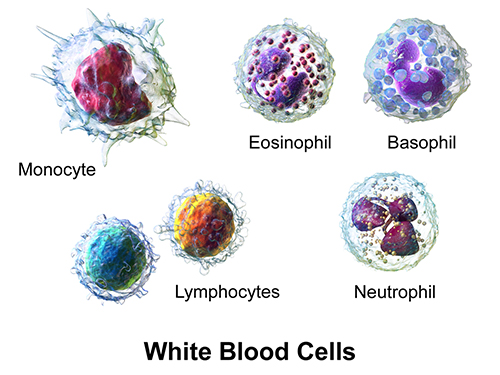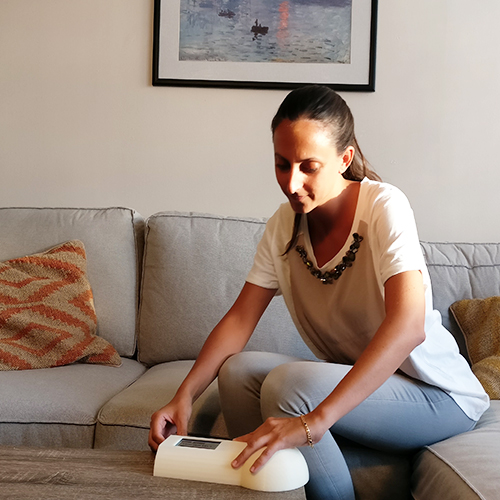Get Blood Results Without Needles?
-
-
slice.mit.edu
- 1
Filed Under
Recommended

Imagine a blood cell counter that needs no blood. A small, non-invasive, portable device to monitor white blood cells has the potential to make great strides in healthcare treatment—and that’s the goal of MIT startup Leuko labs and their new device.
The in-home immune system monitor uses innovative optics that can see through the skin into users’ superficial capillaries and gather data as white cells flow. Then, the company’s algorithm analyzes the images of the blood and estimates the white blood cell counts. The device has the potential to lower the risk of infection in outpatient chemotherapy patients that have their immune system depressed and avoid unnecessary visits to the hospital. In addition to cancer patients, in the future, the technology would allow everyone to differentiate between a viral and a bacterial infection.
 "It allows the patient to track their body’s response to chemotherapy treatment by monitoring white cell levels in the blood," says Aleksandra (Ola) Kalinowska ’15, who got involved in the venture in the spring and began working full-time at Leuko this summer doing mostly development, manufacturing, and user-testing efforts."These white blood cell counts serve as an indicator of the body’s immune system, which is severely weakened every time the patient receives a dose of chemo, putting them at high risk of infection. With Leuko's daily monitoring, doctors would be able to prescribe preventative medications, personalize chemo dosing, and ultimately provide better outcomes during chemotherapy treatment."
"It allows the patient to track their body’s response to chemotherapy treatment by monitoring white cell levels in the blood," says Aleksandra (Ola) Kalinowska ’15, who got involved in the venture in the spring and began working full-time at Leuko this summer doing mostly development, manufacturing, and user-testing efforts."These white blood cell counts serve as an indicator of the body’s immune system, which is severely weakened every time the patient receives a dose of chemo, putting them at high risk of infection. With Leuko's daily monitoring, doctors would be able to prescribe preventative medications, personalize chemo dosing, and ultimately provide better outcomes during chemotherapy treatment."
Co-founder and CEO of Leuko Carlos Castro-González, a catalyst fellow with the MIT linQ healthcare innovation partnership program in Madrid, saw the side effects of chemotherapy while doing clinical rotations and began working to address the problem. The Leuko team is made up of many others from the MIT linQ program as well as Kalinowska, Ramon Gamble MBA ’17, and Alvaro Martinez Higes MBA ’17.
In addition to helping patients detect and monitor infection, research shows that many cancer patients could tolerate a higher frequency of chemotherapy—a fact that could be gained in part by more closely observing white blood cell counts. With this more accurate information, chemotherapy treatments could become more frequent and therefore more effective for those who can tolerate an increased dose. It can also help patients more closely and easily monitor their own counts so that they can spend time out and about when they’re healthy or be sure to stay home when there is an indication that their immune system is compromised.
Leuko is completing its proof of principle phase and entering its first clinical tests, with devices currently being tested. In August 2016, Leuko started testing its prototype on chemotherapy patients at Massachusetts General Hospital (MGH) and by December 2016, two working prototypes will have completed their first round of clinical testing and design revision. If Leuko Labs' technology eventually gains FDA approval, the product will greatly improve the quality of life for patients undergoing chemotherapy.
To help further their venture, the startup recently participated in MIT Delta V startup accelerator, receiving entrepreneurship training, access to coaches and mentors, mock board reviews, up to $20,000 in equity-free funding, office space, and access to prototyping tools and lab space. In addition to recently receiving funding from the MIT Deshpande Center, Leuko was based in the MIT Martin Trust Center for entrepreneurship this summer and the startup has multiple mentors within MIT, including professors and alumni in industry that have been invaluable resources in making their vision a success.








Comments
Carla Fink
Wed, 10/05/2016 12:06pm
As a recently-diagnosed cancer patient getting oral treatment at home, and not really enjoying the trips to the hospital for blood draws, I have been imagining that there MUST be a way to monitor blood counts more easily, as diabetics do. Et voila! Here it is! Is there any way I can become part of the clinical trial for using the device? I'm in the Boston area and have connections to both MGH (by work) and MIT (by marriage) - if that helps.
Great work you guys!!
Carla Fink